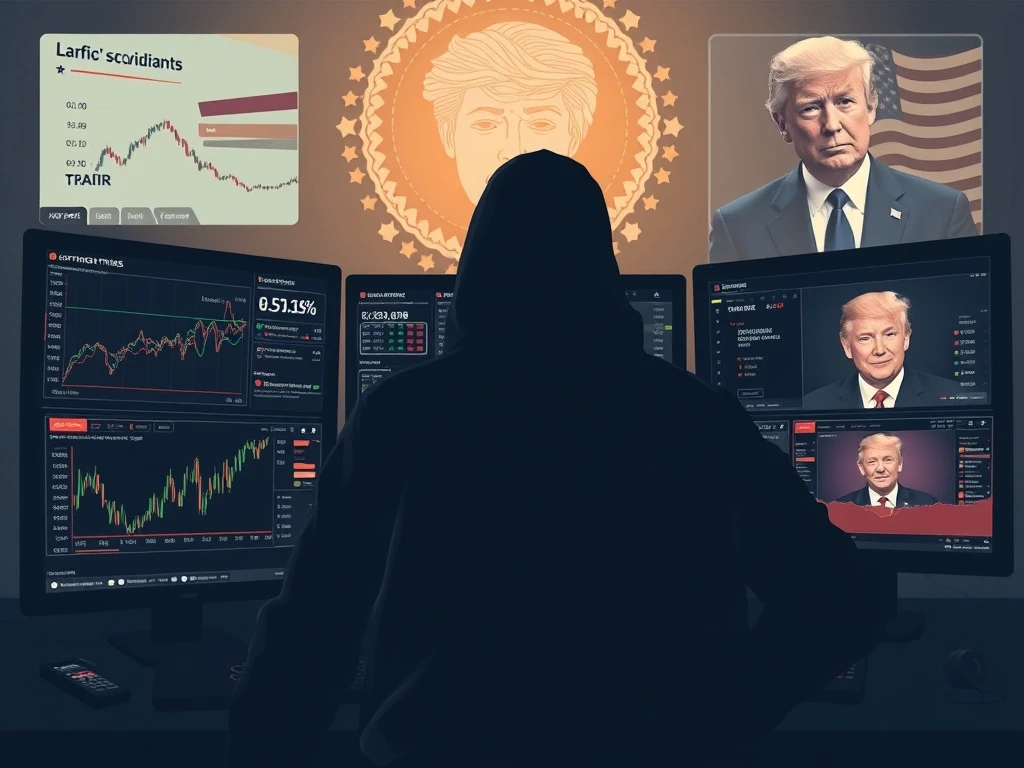Crypto Trader’s Astounding Bets: From Trump Tariffs to CZ Pardon Speculation

A mysterious **crypto trader** has captured the attention of the cryptocurrency world. This individual seemingly possessed uncanny foresight. They reportedly made millions shorting the market during a significant **Trump tariff** announcement. Now, the same trader appears to have profited again. This time, their successful wager involved a potential **CZ pardon**. Many observers wonder: Was this brilliant analysis, or did something more clandestine occur? This intriguing situation sparks debate across the crypto community.
The Astounding Profits from a Trump Tariff Short
The story of this trader first gained widespread notice during a volatile market period. Hours before former US President Donald Trump announced a 100% tariff on China, a large short position opened on Bitcoin and Ethereum. This move was exceptionally timed. Consequently, when Trump’s announcement hit, crypto prices plummeted. The trader reportedly earned an astonishing $190 million from these shorts. Such precise timing immediately fueled speculation. Many within crypto circles suspected the trader had access to privileged information. This event ignited the initial whispers of **insider trading**.
On-chain sleuths quickly began investigating. They tracked the movements of the associated wallets. The sheer scale and accuracy of the short positions were remarkable. This success raised questions about market fairness. Furthermore, it highlighted the potential for information asymmetry in the digital asset space. The crypto community watched closely. They sought answers regarding this extraordinary trading feat.
Connecting the Dots: A Polymarket Bet on CZ’s Pardon
The same mysterious **crypto trader** has now re-emerged in a new controversy. On-chain sleuth Euan uncovered compelling Etherscan data. This data linked the trader’s wallet to a **Polymarket bet**. Polymarket is a decentralized prediction market. Here, users wager on future events. The bet in question concerned Changpeng ‘CZ’ Zhao. Specifically, it predicted that Trump would pardon the Binance founder by 2025. This wager proved successful. The crypto wallet reportedly netted $56,522 from this specific **Polymarket bet**.
This second, highly successful prediction reignited the insider knowledge debate. Critics pointed to the pattern. They suggested an improbable coincidence. The trader’s ability to foresee two distinct, high-impact events seemed beyond mere luck. Therefore, many asked if the trader possessed a unique informational advantage. The connection to the initial Trump tariff short further complicated the narrative.
Insider Trading Allegations: A Deep Dive into the Debate
The dual successes sparked intense discussions about **insider trading**. On-chain investigator Coffeezilla voiced strong suspicions. He stated on X, “Looking like obvious insider knowledge.” He reshared a post from another sleuth, Eye. Eye commented that the trader “knows something we don’t know.” These sentiments reflect a widespread concern. The crypto community often grapples with issues of market manipulation. Such precise trades amplify these fears.
However, not everyone agrees with the insider trading narrative. Some market participants argue the **CZ pardon** was a predictable outcome. Swan Desk CEO Jacob King shared his own successful bet. He made $956,000 profit betting on a Zhao pardon. King explained his reasoning. He noted CZ’s significant $2 billion investment into the WLFUSD Stablecoin. “That move practically screamed pay-for-pardon,” King asserted. This perspective suggests a strategic, rather than illicit, understanding of political and market dynamics.
Crypto commentator Abbas also questioned the severity of the insider trading claims. He highlighted the relatively modest profit of $56,522 from the Polymarket bet. “You really think someone with access to the President of the United States would use insider information to make $56k?” Abbas asked. He further argued that a pardon for CZ was not an “extremely unlikely event.” Many had discussed it for a long time. These counterarguments underscore the complexity of attributing motives in such high-stakes scenarios.
Garrett Jin’s Denial and the Search for the Trader
Amidst the speculation, former BitForex CEO Garrett Jin became entangled in the controversy. Crypto researcher Eye initially claimed Jin controlled the whale wallet. This wallet opened the Bitcoin short position before the **Trump tariff** announcement. Jin, however, vehemently denied these allegations. He reiterated having “no connection with the Trump family.” He also denied any involvement in insider trading. Jin clarified his position in a subsequent X post. He stated, “The fund isn’t mine — it’s my clients’. We run nodes and provide in-house insights for them.”
Jin’s denial adds another layer to the mystery. It redirects the focus back to the unknown **crypto trader**. The identity of this individual remains elusive. The debate continues to rage. Was this a master of market timing? Or did they exploit privileged information? The answer could have significant implications for trust and regulation within the crypto space. The community awaits further developments with keen interest.
Broader Implications for Crypto Market Integrity
This saga raises critical questions about market integrity. The potential for **insider trading** erodes trust. It undermines the principle of a level playing field. Prediction markets like Polymarket also face scrutiny. While offering unique insights, they can also become platforms for controversial bets. Transparency in such markets is crucial. Moreover, the incident highlights the ongoing challenge of identifying and prosecuting illicit activities in decentralized environments.
The crypto market thrives on innovation and decentralization. However, it must also address vulnerabilities. These include information asymmetry and potential manipulation. The case of the mysterious **crypto trader** serves as a stark reminder. Constant vigilance is necessary. Robust on-chain analytics are vital. They help ensure fairness and maintain investor confidence. The industry continues to evolve. Therefore, safeguarding market integrity remains a top priority for all stakeholders.





